Recently, there were conducted several scientific trials on Viagra (Sildenafil). Viagra was taken as a basis for increasing the risk of colon cancer. It was also used in clinical trials for cardiac problems treatment. Let’s get acquainted with these two researches that bring something new to the notion of Viagra.
Viagra reduces the risk of colon cancer
Scientific research aimed at combating erectile dysfunction revealed that the minimum dose of the well-known Viagra can significantly reduce the risk of colon cancer. However, this drug will not be able to cure already established tumors. But it can be an effective preventative approach.
So far, the medicine has been tested only on genetically modified rodents (microdoses of Viagra were added to drinking water). A mutation that is often found in humans also forced their intestines to establish tumors with great frequency and speed. The sharp increase in polyps almost always results in colorectal cancer, also known as colon cancer.
According to scientists, experiments have shown that a minimum dose of Viagra reduces the number of tumors in experimental mice by almost 50%.
According to the Medical College of Georgia at Augusta University, the next steps should include a clinical trial of the drug in patients at high risk for colorectal cancer, such as a family history of the disease, prior diagnosed multiple polyps and chronic intestinal inflammation, such as colitis. Viagra is already a surprise. Initially, the drug was created as a remedy for coronary heart disease.
However, the drug has been used for many years in a wide range of doses and age groups, from premature babies with pulmonary hypertension to the elderly with erectile dysfunction. Also, Viagra is able to increase levels of GMP, which affects the intestinal membrane – the epithelium.
Scientists believe that rectal and colon cancer in 5% of cases is caused by chronic inflammation, 80% due to the spontaneous occurrence of non-stop reproducing groups of cells. There are suggestions that intestinal cancer may be associated with the use of carcinogens similar to those found in processed meat products.
Viagra – useful for cardiac health
Viagra can be a useful and safe medication for cardiovascular system diseases. Long-term and regular use of sildenafil protects the heart from many diseases without any side effects.
The main ingredient of Viagra is a selective inhibitor of cGMP-specific PDE5. This substance blocks the PDE5 enzyme, which makes it difficult to relax muscle tissue. PDE5 is also found in the heart, that is why scientists have long meant that Viagra may be useful not only in the urological field.
Scientists from the Sapienza University of Rome conducted a meta-analysis of randomized control trials of the drug to test this hypothesis. After reviewing medical articles from 2004 to 2014, presented in the four largest scientific databases, the researchers found 24 cases of PDE-5, where it was possible to check the effect of the substance on the cardiac state. A total of 1,622 men from various countries participated in these trials.
It turned out that in patients suffering from left ventricular hypertrophy, sildenafil did not allow the heart to expand and change shape. Moreover, PDE5 improved heart function in all patients, regardless of their health status. It also has no side effects on blood pressure.
The researchers claim that PDE5 (Viagra) can be recommended for men suffering from cardiac muscle tightening and heart failure (in the early stages of the disease). To finally verify the effectiveness of this substance, scientists are insisted on conducting large-scale clinical trials. First of all, it is necessary to understand how PDE5 affects the body of women (all known studies were conducted with the participation of male Viagra consumers).




